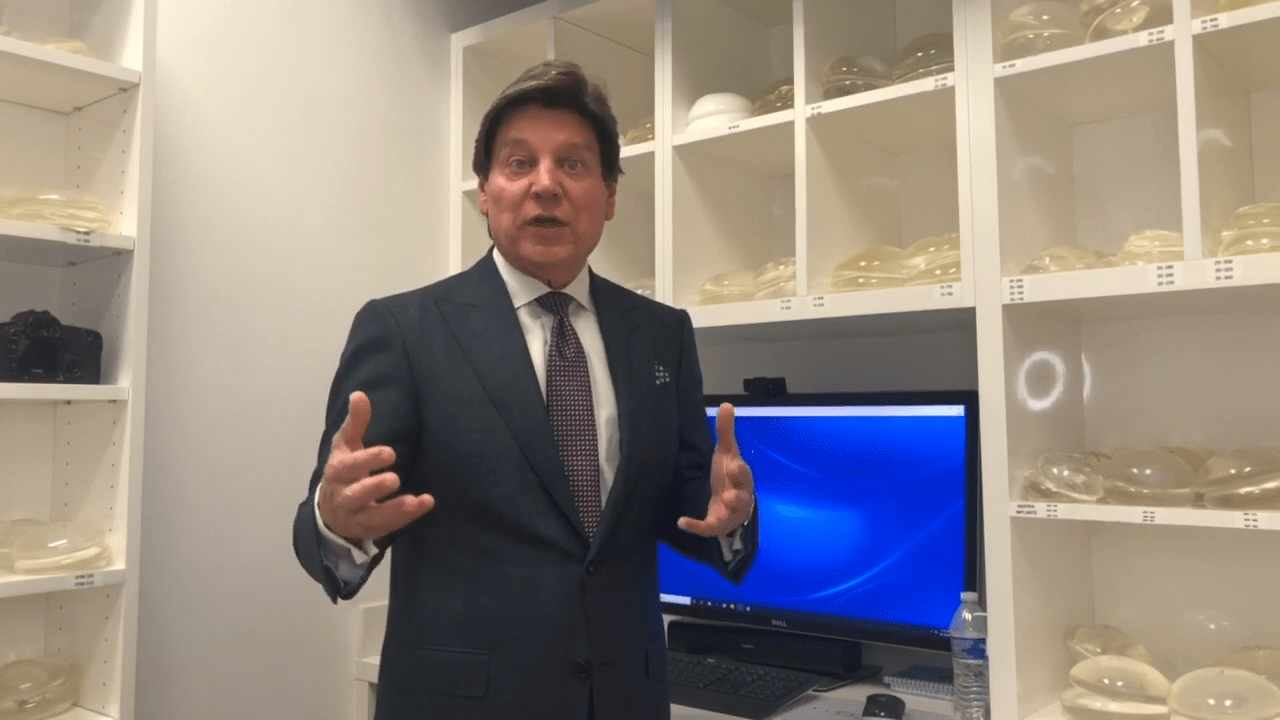Safety
Breast augmentation is one of the most popular cosmetic surgery procedures in the United States. Thousands of women of all ages seek out the procedure each year for a variety of reasons ranging from aesthetic concerns to reconstruction after a mastectomy.
Reserve a Free VIP Consultation

The Safety of Breast Implants
Generally speaking, there are two types of breast implants that are currently available in the US: silicone and saline. While the materials used to fill these implants differ, the outside of all implants are made of a silicone shell. Silicone breast implants are filled with silicone gel while saline breast implants are filled with sterile saltwater.
SALINE BREAST IMPLANTS
SILICONE BREAST IMPLANTS
Are Breast Augmentations Safe? Breast Expert Dr. Vitenas Explains!

Implant Shape, Size, and Texture
FAT TRANSFER BREAST AUGMENTATION
If you don’t like the idea of breast implants or are concerned about the safety of implants, you might have another option for breast augmentation. Depending on how much fat you have available, you might be able to augment your breasts with fat transfer. Fat transfer is a two-step process. First, the surgeon harvests the fat from one area of your body, such as your hips or thighs. They then sterilize and prepare the fat before injecting it into the breasts to increase their size. One notable benefit of fat transfer for breast augmentation is that it uses your own fat. There’s no risk of your body rejecting the fat or having a reaction to it. You also won’t need to monitor the fat for ruptures or replace it in a few years since the cells will establish themselves in their new location and typically provide permanent enhancement.

A Quick History of Breast Implants
The first breast augmentation surgery using silicone implants was performed in 1962. Although miraculous for their time, early breast augmentation and early breast implants were nothing like what’s available today. Complications like hematomas and capsular contracture were more common in the early days of breast surgery. After their introduction, silicone breast implants became increasingly popular and remained so for several decades. But as their popularity increased, so did concerns about their safety and the risks involved. Some women who had gotten silicone implants believed that their implants were responsible for a range of medical problems, including conditions such as lupus and fibromyalgia. In some instances, women believed that removing their implants allowed their medical problems to clear up.
Although there were no conclusive studies that proved implants were connected to specific health issues, concerns over the safety of implants led the FDA to pull silicone implants from the cosmetic market in 1992. From that point, only women seeking reconstructive surgery could receive silicone implants. Women wanting to increase their breast size for cosmetic reasons were left with only the option of saline implants.
Silicone Implants Back on the Market
From 1992 to 2006, the FDA reviewed research and ultimately found that there wasn’t a link between standard silicone implants and specific health conditions. It decided to allow surgeons to use silicone implants for cosmetic surgery once again. The newly available silicone implants actually offered several advantages over saline options for the right patients. For one thing, silicone implants have a more natural feel than saline implants.
They are also less likely to ripple or appear visible under the skin. Silicone implants also have a lower risk for capsular contracture than saline. Another big difference between saline and silicone implants is what happens to the implant if it should rupture or leak. In the case of saline implants, the saltwater in the implant is likely to seep out into the body, where it’s safely absorbed. Depending on the quality of the leak or rupture, the implant might quickly deflate or the process might be more gradual.
Since silicone implants are filled with a thick, viscous gel, they aren’t going to seep out or “leak” into the body the way a saline implant would. That can be both good news and bad news.
The good news is that the implant won’t change much in terms of size or shape should it leak. The bad news is that you’d need to use imaging to determine whether or not the implant is leaking.
Silicone Implants and Cancer

What Are the New Concerns
About Breast Implants?
Silicone implants were taken off of the market in the 1990s because of concerns that they were causing autoimmune disorders. Women who had silicone implants sometimes experienced certain symptoms and subsequently had their implants removed. Many of those women stated that they experienced an improvement in their symptoms after the implants were taken out.
After 14 years of research and study, the FDA determined in 2006 that there was no evidence of a connection between silicone implants and autoimmune disease. Now, some women’s groups and women who have had silicone implants are stating that they still believe there is a connection between their implants and symptoms, particularly inflammatory reactions in the body.
As a result of the most recent statements, the FDA warned two makers of breast implants that they did not perform adequate studies on the effects of implants on women’s health. Those studies are a requirement for approval. The FDA also decided to look more closely at silicone implants and are in the process of deciding what to do next.
Complications and Risks of Breast Implants
Any cosmetic procedure or implant has its risks and the potential for complications. Knowing what the possible complications are and what you can do to minimize them will help you make the most of your breast implants.
Capsular Contracture
After a surgeon places an implant in the breast, the body’s healing response is to develop a layer of scar tissue around it. The tissue that surrounds the implant is known as a capsule. In most cases, the capsule and the implant co-exist peacefully, without complications or injury. In some instances, though, the capsule can begin to shrink around the implant. Capsular contracture occurs when the capsule squeezes and constricts the implant.
Why capsular contracture occurs isn’t fully understood. Complications after breast augmentation, such as infection or a hematoma, can make it more likely to occur. How the surgeon handles the implants can also influence the risk of capsular contracture.

ASYMMETRY
Although many people choose to get breast implants to correct asymmetrical breasts, it can also be the case that the implants themselves make the breasts uneven. Breast asymmetry can occur with implants for a few reasons. In some cases, it could be because an implant has ruptured and deflated.
Changes to the breasts after surgery can also make them uneven. For example, if a woman gets pregnant and breastfeeds, her natural breast tissue can increase or decrease in size, affecting the results of her breast augmentation.
BREAST AND NIPPLE PAIN
Some people experience pain in the breasts or around the nipples after getting implants. Some soreness is to be expected, especially right after surgery. If pain persists, it can be worth discussing the issue with your plastic surgeon.
Another thing to be aware of is that implants might change the sensation in the nipples or breast area. You might have increased or decreased sensation. In some cases, the change is temporary and goes away as the breasts heal from surgery. Getting pregnant or breastfeeding later on can also contribute to sensation changes.
WRINKLES OR RIPPLING OF THE SKIN
In some cases, the edges of the implant might be visible beneath the skin. Whether there is wrinkling or rippling of the skin depends in large part on the amount of natural breast tissue you have and on the type of implant you choose.
Saline implants are more likely to be visible under the skin. Rippling and wrinkles are also more likely in women with less natural breast tissue. If the visible ripples or wrinkles bother you, one option is to switch to silicone implants.
RUPTURE OR DEFLATION
Saline implants can deflate if they develop a leak or hole in the outer shell. The deflation can be dramatic but isn’t a cause for concern from a health perspective. Your body will naturally absorb the saline solution.
If the implant does deflate or rupture, you’ll want to remove it or replace it for aesthetic reasons, as the breasts will most likely look uneven after one loses its volume. Rupture can be more difficult to spot in a silicone implant. If you suspect an implant has developed a leak, your doctor can perform imaging to check on it.
Tips for Breast Implant Safety
There are some steps you can take to protect your implants and reduce the risk of complications after breast augmentation. Choosing the right surgeon is the first and most important step. Ask prospective surgeons questions about how they handle the implants, how they position them, and what other steps they take to minimize complications. You can also ask to speak to some of the surgeon’s past patients to find out more details.
Breast implant massage can help to reduce the risk of capsular contracture and other complications. Your surgeon will most likely give you instructions and show you how to perform the massaging exercises after your surgery.
If they don’t, feel free to ask for more information. Finally, take steps to avoid anything that could put excessive force or pressure on the implants, to minimize the risk of rupture. You might want to avoid contact sports, for example.
Is There a Connection Between Breast Implants and Autoimmune Diseases?
Usually, the immune system helps to keep us healthy by attacking “intruders” and perceived threats. Those threats can be anything from a cold virus to bacteria such as E. coli. In some cases, the immune system works overtime and attacks substances that aren’t particularly harmful, such as pollen or peanut butter. In those cases, the reaction from the immune system ends up being more dangerous than the substance itself. There are also cases when the immune system gets confused and starts attacking the body’s own cells. For example, type 1 diabetes develops when someone’s immune system attacks the cells that produce insulin. When the immune system starts attacking the body, an autoimmune disease develops. What triggers autoimmune diseases or why they develop isn’t fully understood. Some people have blamed breast implants for autoimmune disorders.
They note that their symptoms started around the time that they got their implants and in some cases, state that symptoms stopped after the implants were removed. Although there are stories and anecdotes claiming that implants can be responsible for autoimmune issues, scientific studies have not yet drawn a link between the two. It could be that a person who had implants and started experiencing symptoms of an autoimmune disorder would have had those symptoms even without the implants. While there might not be a definitive connection between implants and autoimmune diseases, it is worth pointing out that sometimes people do have reactions to implants. If you feel discomfort or think that your body is responding to implants in a negative way, the best option for you might be to have them removed.
Can Breast Implants Cause Cancer?
Another big concern when it comes to breast implants is the potential connection between implants and cancer. Concerns about cancer were among the reasons silicone implants were taken off of the market in the first place. According to the FDA, however, silicone implants aren’t associated with an increased risk of cancer.
But there is one type of cancer that is associated with implants: breast implant-associated anaplastic large cell lymphoma (BIA ALCL). BIA ALCL is a very rare form of cancer. It occurs in about 1 out of every 3,817 to 30,000 women with implants. Although it develops around the implant and in the breasts, BIA ALCL is not a type of breast cancer.
As a lymphoma, it’s a cancer of the immune system. Not only is BIA ALCL very, very rare, it’s also very treatable, especially when detected early on. Although having textured implants seems to slightly increase the risk of developing BIA ALCL, this type of cancer has been found in patients with both silicone and saline implants.
What to Know About BIA ALCL
Breast implant-associated lymphoma was first identified by the FDA in 2011. Although the risk of developing BIA ALCL is very low, this type of cancer can be very serious and potentially fatal if it does occur. Treatment of lymphoma typically involves removal of the implant and scar tissue. Some people also undergo chemotherapy and radiation. Often, treatment is very successful.
The main symptom of this type of cancer is swelling in the area near the implant. There might be pain in the breast and a fluid-filled mass may develop. There seems to be a connection between the use of textured (instead of smooth) implants and BIA ALCL. For that reason, many textured implants have been pulled off of the market.
WHAT IS BREAST IMPLANT ILLNESS?
Some people with implants have reported developing a range of symptoms following their surgery. Some have labeled these symptoms breast implant illness. To date, though, there is no conclusive evidence the breast implants are directly responsible for the symptoms, as Harvard Health notes. Some possible breast implant illness symptoms include brain fog, fatigue, and depression. If you are experiencing any of those and are concerned about their connection to your implants, you can discuss your concerns and options with your surgeon.
What Can You Do if You’re Concerned About Your Breast Implants?
Currently, there is no concrete evidence or any scientific studies demonstrating that silicone breast implants are connected to autoimmune disorders or inflammation in the body. But that doesn’t mean that you don’t have a right to be concerned about the safety of your implants.
After all, it is your body and you want to care for it as best as you can. If you are concerned about your implants, the best thing to do is to discuss your concerns with your plastic surgeon. If you’re having symptoms you believe are related to your implants, talk about them with your surgeon.
They can help to put your mind at ease and provide you with options. Depending on your situation, you might need to remove your implants and replace them with a new pair. Or, you might decide that taking your implants out entirely is the best option.
Schedule A Consultation
How to Stay Safe Before, During, and After Breast Implant Surgery
Preparation is key to a safe and successful breast implant surgery. Here’s what you can do to stay as safe as possible.
Choose Your Plastic Surgeon Carefully
Perhaps the most important thing you can do from a safety perspective when considering breast augmentation is to choose the right plastic surgeon. Beyond safety, there are additional reasons to choose your plastic surgeon with care. You want a surgeon who has a track record of producing great results and makes you feel at ease.One thing to pay close attention to is whether or not the surgeon is board-certified. To earn board certification, a surgeon needs to complete additional training beyond medical school, pass an exam, and complete continuing education. The American Board of Plastic Surgery is responsible for certifying plastic surgeons. Along with checking for board certification, also make sure that the plastic surgeon you are considering specializes in breast augmentation. Plastic surgeons who focus on breast surgery are likely to be aware of the specific challenges of procedures such as breast augmentation and are more likely to know how to perform the procedures in a way that provides the best results while protecting a patient’s health.
Check Out the Surgical Facility
Most breast augmentation surgeries aren’t performed in a hospital setting but instead are done in an outpatient surgical facility. For safety reasons, make sure you check out the surgical facility before deciding to go forward with the procedure. You want to have your surgery in a facility that is clean, technologically advanced, and accredited.
Follow Any Pre-Surgery Instructions from Your Plastic Surgeon
Be Upfront About Your Medications and Allergies
During your consultation, your plastic surgeon is likely to ask you about any medications you take or any allergies you might have, including allergies to drugs or anesthesia. Your best and safest option here is being honest and upfront about every medication you take or any allergies you know you have. One or more of your current medications might be on the list of those that aren’t recommended before elective surgery. If that is the case, your surgeon needs to know so that they can discuss all of your options with you.
Find Someone to Drive You Home After Surgery
After breast augmentation, you can most likely expect to return home the same day, once the anesthesia has worn off. Even after you’ve woken up from the surgery, it’s common to feel a little groggy and “out of it.” You might also be taking medications to ease any discomfort that can make you feel drowsy. For that reason, you need to have someone drive you home from the surgical facility. Since the person who takes you home should take care of you once you get there, the safest thing to do is enlist the help of your partner or spouse, a close friend, or a relative. More likely than not, the staff at the surgical facility won’t be comfortable letting you get in a taxi or Uber.
Follow Your Surgeon’s Post-Surgical Instructions
Just as it is important to follow the instructions your surgeon gives you before breast augmentation, it’s also essential to follow any instructions they provide after the surgery. Those instructions might include when to return for a follow-up visit, what activities to avoid during recovery, and what types of medicines are safe to take.
BREAST SURGERY OPTIONS
If you do decide to have breast surgery, you have several options. In many cases, the choice is between breast augmentation or a breast lift. You can also combine the two. Breast augmentation increases the size of your breasts, usually with implants. A breast lift changes the shape and elevation of the breasts. The surgeries can be performed together or on their own. Other options, once you have implants, include implant revision or implant exchange. Usually, a revision procedure is only performed if there’s an issue with the implant, such as a rupture or capsular contracture. Implant exchange is typically performed if you want to change your implants because you’re no longer satisfied with their shape or size.
Notable Benefits of Cosmetic Breast Augmentation
Breast augmentation carries a number of benefits for women. The procedure can increase the size and fullness of the breasts, create a more feminine figure, and increase self-confidence. Many women also seek the procedure after losing volume in their breasts after giving birth and may have it performed in conjunction with a breast lift if they experience breast sagging.
Reconstructive Breast Augmentation
Breast surgery is also beneficial for women who have undergone a mastectomy or lumpectomy after breast cancer treatment. When performed for this purpose, the procedure is known as breast reconstruction surgery. In general, women who receive breast reconstruction surgery undergo multiple procedures before their reconstruction is complete. There are also different types of procedures they may get depending on the type of mastectomy they have had and their body type. The procedures are divided into two categories: flap reconstruction and implant-based reconstruction. Flap reconstruction relies on the woman’s own tissue from another part of the body to create a new breast, while implant-based reconstruction uses traditional breast implants.
Breast Augmentation Pros & Cons
Breast Implant Revision Pros & Cons
Breast implant revisions take a little less time to recover from and sutures are often placed beneath the skin for increased convenience. Revisions are yet another surgery, however, so this procedure also comes with the risk of pain, infections, bleeding, and scarring. This procedure also requires the same six weeks to heal completely as a regular augmentation would, but work can be resumed in a week or two, and exercise can be attempted after four weeks.
Breast Implant Exchange Pros & Cons

Breast Augmentation SafetyFAQ
The FDA states that both saline implants and silicone implants are safe. Whether one or the other is right for you depends on your preferences and goals.
Research has concluded that there are no noticeable differences in terms of the safety of silicone and saline breast implants. However, there are certain advantages that one type may have over the other. They include the following:
- Ruptures are easier to detect in saline implants. When a saline implant leaks, the body harmlessly absorbs the saltwater and the implant deflates within the chest. Silicone implant ruptures are usually undetectable without imaging and may cause issues in the breasts.
- Silicone implants generally give better aesthetic results due to looking and feeling more natural.
- Saline implants require a smaller incision because they are filled after they are inserted. They can also be more easily adjusted post-surgery if the woman prefers a size difference or some other type of adjustment.
- Saline implants are available for anyone at least 18 years old while silicone is only available to those 22 and older.
- When breast augmentation is performed by a reputable, experienced, board-certified surgeon, the procedure is typically very low risk. Patients should be aware of the surgical risks that exist, but the surgery is very safe overall for women who are in good health.
It’s natural to have ruptured breast implant safety concerns, for saline or silicone implants. If a saline implant ruptures, it usually deflates. A ruptured silicone implant might have any visible signs but the rupture can be detected with imaging.
There is a small risk of lymphoma associated with textured implants. Some people also report symptoms they associate with their implants but the scientific evidence is lacking.
The FDA did request that certain types of textured implants be recalled. If you have implants and aren’t sure if yours are affected by the recall, talk to your surgeon.
The death rate from breast augmentation is very low. One study found that there isn’t an increased risk of death following breast augmentation.
It is possible to develop an infection due to an implant years after surgery, but the risk is very low. If they are going to occur, most infections come up in the immediate post-surgical period.
Fat transfer can be a suitable alternative to implants for certain patients. Like any plastic surgery, it does have some risks, such as bleeding and infection.
Speaking with a plastic surgeon before breast augmentation can help you choose the right implants for you and minimize the risk of complications and safety issues.
Dr. Paul Vitenas is a board-certified plastic surgeon in Houston, Texas. He specializes in breast surgery and can answer your questions about implants and address any safety concerns you may have. To schedule a consultation, call 972-737-7477 today.

